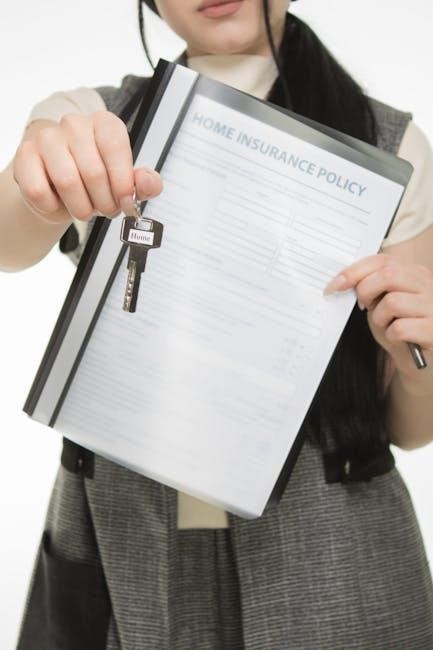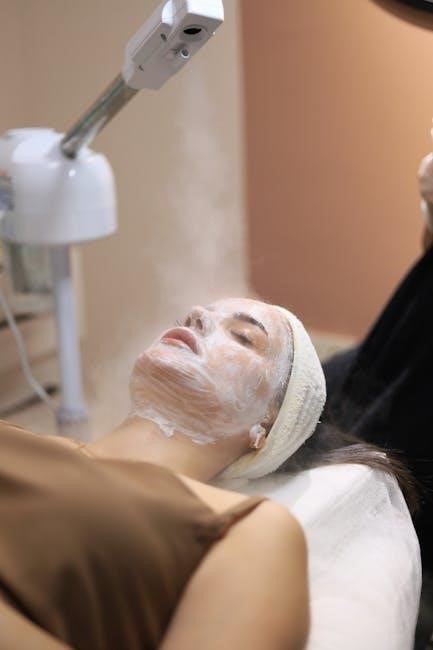The Sola Salon Lease Agreement outlines the framework for renting salon spaces‚ detailing terms like lease duration‚ rent‚ and responsibilities‚ ensuring clarity for salon professionals seeking independence.
Overview of Sola Salon Lease Agreement
The Sola Salon Lease Agreement is a legally binding contract that outlines the terms and conditions for renting a salon space. It provides a structured framework for salon professionals‚ ensuring clarity on rent‚ lease duration‚ and responsibilities. The agreement balances flexibility for salon owners with legal protections‚ addressing key aspects like permitted activities‚ maintenance‚ and termination policies. By understanding the lease‚ salon suite renters can operate confidently‚ knowing their rights and obligations are clearly defined. This document is essential for maintaining a professional and mutually beneficial relationship between salon owners and renters.
Importance of Understanding the Lease Agreement
Understanding the Sola Salon Lease Agreement is crucial for salon professionals to ensure a smooth and legally compliant rental experience. The lease outlines rights‚ responsibilities‚ and expectations‚ protecting both salon owners and renters. It provides clarity on financial obligations‚ usage terms‚ and termination policies‚ helping to avoid disputes. By thoroughly reviewing the agreement‚ renters can make informed decisions‚ operate confidently‚ and maintain a positive professional relationship with salon owners. This understanding is essential for safeguarding business interests and ensuring long-term success in the salon suite rental model.

Key Elements of the Sola Salon Lease Agreement
The lease includes terms like lease duration‚ rent‚ responsibilities‚ permitted activities‚ termination policies‚ and insurance requirements‚ ensuring clarity and mutual understanding between salon owners and renters;
Parties Involved in the Lease
The Sola Salon Lease Agreement involves two primary parties: the salon owner (lessor) and the renter (lessee). The salon owner is the entity granting the right to use the salon space‚ while the renter is the individual or business renting the space. Both parties are legally bound by the terms of the agreement‚ which outlines their respective rights and responsibilities. In some cases‚ property managers or legal representatives may also be involved to oversee the lease execution and ensure compliance with all terms. Clear identification of all parties is essential for enforcing the lease effectively.
Term and Renewal of the Lease
The lease term specifies the duration of the agreement‚ typically ranging from one to three years. At the end of the term‚ both parties may choose to renew the lease under revised or existing conditions. Renewal terms are usually negotiated in advance‚ with adjustments to rent or other clauses as needed. The agreement often requires a notice period for renewal or termination‚ ensuring both parties have ample time to prepare for any changes. Understanding the term and renewal process is crucial for long-term planning and stability in the salon business.
Rent and Additional Charges
Rent and additional charges are detailed in the Sola Salon Lease Agreement‚ outlining the base rent‚ due dates‚ and payment methods. Additional fees may include utilities‚ maintenance‚ or marketing contributions. These charges vary by location and lease terms‚ ensuring a clear understanding of financial obligations. Salon professionals should review these sections carefully to budget effectively and avoid unexpected costs‚ as failure to meet payment terms may result in penalties or lease termination. Transparency in rent structures helps maintain a positive landlord-tenant relationship.
Responsibilities of the Salon Owner and Renter

The Sola Salon Lease Agreement clearly outlines the responsibilities of both the salon owner and the renter. Salon owners are typically responsible for maintaining common areas‚ ensuring compliance with local regulations‚ and providing basic utilities. Renters‚ on the other hand‚ are expected to maintain their rented space‚ adhere to lease terms‚ and obtain necessary insurance; Both parties must uphold the agreement’s conditions‚ ensuring a professional and respectful environment. Clear responsibilities help prevent disputes and promote a smooth operational relationship.

Legal Considerations and Clauses
The Sola Salon Lease Agreement includes clauses addressing insurance requirements‚ liability‚ and compliance with local laws‚ ensuring both parties understand their legal obligations and protections.
Use of Premises and Permitted Activities
The Sola Salon Lease Agreement specifies permitted activities within the rented space‚ ensuring compliance with local regulations. Salon professionals are typically allowed to conduct beauty services like hair styling‚ nail care‚ and skincare. The agreement may restrict certain activities‚ such as retail sales of unauthorized products or use of hazardous materials. Compliance with health and safety standards is often mandated to maintain a professional environment. Understanding these clauses helps prevent disputes and ensures smooth operations for both parties involved in the lease.
Maintenance and Repair Responsibilities
The Sola Salon Lease Agreement clearly defines the responsibilities for maintaining and repairing the leased premises. Generally‚ the salon owner is responsible for structural repairs‚ such as plumbing and electrical systems‚ while the renter handles maintenance of their specific space‚ including fixtures and equipment. Renters are often required to keep their area clean and functional‚ adhering to health and safety standards. Failure to address repairs may result in penalties or termination of the lease. Understanding these responsibilities ensures a smooth operational relationship between both parties.
Termination and Cancellation Policies
The Sola Salon Lease Agreement outlines specific terms for termination and cancellation. Both parties must adhere to mutually agreed-upon conditions‚ often requiring written notice. Renters typically must provide a notice period‚ which varies depending on the lease terms. Early termination may result in penalties or forfeiture of the security deposit. Understanding these policies is crucial to avoid unintended consequences‚ such as financial losses or legal disputes. Proper documentation and adherence to the agreement ensure a smooth process for both salon owners and renters.
Insurance and Liability Requirements
Insurance and liability requirements are critical components of the Sola Salon Lease Agreement. Salon owners typically provide general liability and property insurance‚ while renters are often required to obtain professional liability insurance. This ensures coverage for accidents‚ damages‚ or client disputes. The lease outlines specific insurance obligations for both parties‚ protecting them from potential risks. Understanding these clauses is essential to avoid financial or legal repercussions. Proper insurance coverage safeguards both the salon owner and the renter‚ ensuring a secure and compliant business environment.

Termination and Cancellation Policies
Termination and cancellation policies outline the procedures for ending the lease agreement‚ including required notice periods and potential penalties for early termination‚ ensuring clarity for both parties.
Notice Periods and Procedures
The Sola Salon Lease Agreement specifies the required notice periods for termination‚ typically ranging from 30 to 60 days‚ depending on the terms. Proper written notification must be submitted by either party to initiate the cancellation process. The agreement outlines detailed procedures‚ including delivery methods and timelines‚ to ensure compliance. Failure to adhere to these steps may result in penalties or legal disputes. Understanding these protocols is crucial for a smooth transition and to avoid unnecessary complications or financial repercussions for both salon owners and renters.
Penalties for Early Termination
The Sola Salon Lease Agreement often includes clauses outlining penalties for early termination‚ which can vary depending on the circumstances. These may include monetary fines or the forfeiture of the security deposit. Salon owners and renters must carefully review these terms to understand potential financial implications. Early termination penalties are designed to protect both parties and ensure contractual obligations are honored. Understanding these clauses is essential to avoid unforeseen financial burdens and to maintain a positive working relationship. Reviewing the lease agreement thoroughly is highly recommended before signing.
Financial Implications of the Lease
The Sola Salon Lease Agreement outlines rent‚ additional charges‚ and potential penalties‚ impacting the renter’s budget and financial planning for their salon business operations.
Initial Costs and Security Deposits
Signing a Sola Salon Lease often requires upfront costs‚ including a security deposit and first month’s rent. These fees secure the space and cover potential damages. Additionally‚ renters may need to invest in equipment and supplies to set up their suite. The lease agreement details these expenses‚ ensuring clarity on financial obligations from the start. Understanding these initial costs is crucial for budgeting and planning a successful salon business. Proper documentation and payment terms are typically outlined in the agreement to protect both parties financially.
Ongoing Expenses and Fee Structures

Beyond the initial costs‚ renters should anticipate ongoing expenses outlined in the Sola Salon Lease Agreement. These include monthly rent‚ utilities‚ and shared fees for common areas. Additional charges may apply for services like laundry or parking. The agreement specifies fee structures‚ such as fixed rates or percentage-based revenue shares. Understanding these details helps salon professionals budget effectively and manage their financial obligations throughout the lease term. Transparent fee structures ensure clarity and avoid unexpected costs‚ supporting long-term business sustainability.
Tax Implications for Renters
Renters under the Sola Salon Lease Agreement should be aware of tax implications. Rent payments may be deductible as business expenses‚ reducing taxable income. Additionally‚ renters are often responsible for sales tax on products sold and may need to report income earned from services. It’s important to consult a tax professional to ensure compliance with local and federal tax laws. Understanding these obligations helps renters accurately file taxes and avoid penalties‚ ensuring financial stability for their salon business.
Booth Rental vs. Salon Suite Rental

Booth rental involves paying for a space within a salon‚ while salon suite rental offers a private studio‚ providing more independence and control over the business environment.
Differences in Rental Agreements
Booth rental agreements typically involve paying for a shared space within an existing salon‚ with the owner managing utilities and maintenance. Salon suite rentals‚ however‚ offer private studios‚ granting more control over the environment and operations. Booth rentals often require less upfront investment but may limit branding and autonomy. Salon suite agreements usually include longer terms and specific responsibilities for the renter‚ such as utility payments and minor repairs. Understanding these differences is crucial for deciding which option aligns best with business goals and financial capabilities.
Benefits and Drawbacks of Each Option
Booth rentals offer lower initial costs and shared amenities‚ ideal for those starting out‚ but limit customization and branding. Salon suite rentals provide privacy and control‚ allowing for personalized branding and client experience‚ though requiring higher upfront investment and responsibility for utilities. Booth rentals suit those preferring a collaborative environment‚ while salon suites attract professionals seeking independence and long-term growth. Each option has trade-offs‚ requiring careful consideration of financial capacity‚ business goals‚ and desired level of autonomy.

Key Considerations Before Signing
Understand lease terms‚ including rent‚ duration‚ and termination clauses. Review hidden costs‚ seek legal advice‚ and negotiate terms to ensure alignment with your business goals and financial capacity.
Understanding the Fine Print
Thoroughly reviewing the lease agreement is crucial to avoid hidden fees or restrictive clauses. Look for details on rent increases‚ termination penalties‚ and maintenance responsibilities. Ensure all terms align with your business needs. Consulting a legal expert can help identify potential pitfalls and ensure clarity on your obligations. Understanding the fine print safeguards your interests and prevents future disputes. Prioritize transparency to build a secure and profitable partnership with your salon suite provider.
Seeking Legal Advice
Seeking legal advice is vital to navigate the complexities of the Sola Salon Lease Agreement. A legal expert can review clauses‚ ensuring terms align with your business goals and local laws. They can identify hidden fees and termination penalties‚ protecting your rights. Professional guidance helps avoid future disputes and ensures compliance with regulations. Consulting a lawyer ensures you understand all obligations and can negotiate better terms‚ safeguarding your investment and business interests effectively.
Negotiating Terms and Conditions
Negotiating the terms and conditions of a Sola Salon Lease Agreement is crucial to ensure the agreement aligns with your business needs. Key areas to focus on include rent adjustments‚ lease duration‚ and termination clauses. It’s essential to clarify any ambiguous terms and seek flexible payment structures. Prioritizing open communication with the landlord can lead to mutually beneficial adjustments. Additionally‚ understanding the implications of each clause ensures a fair agreement. Always aim to negotiate terms that balance both parties’ interests while safeguarding your business goals. This step is vital for a successful and stress-free tenancy experience.
